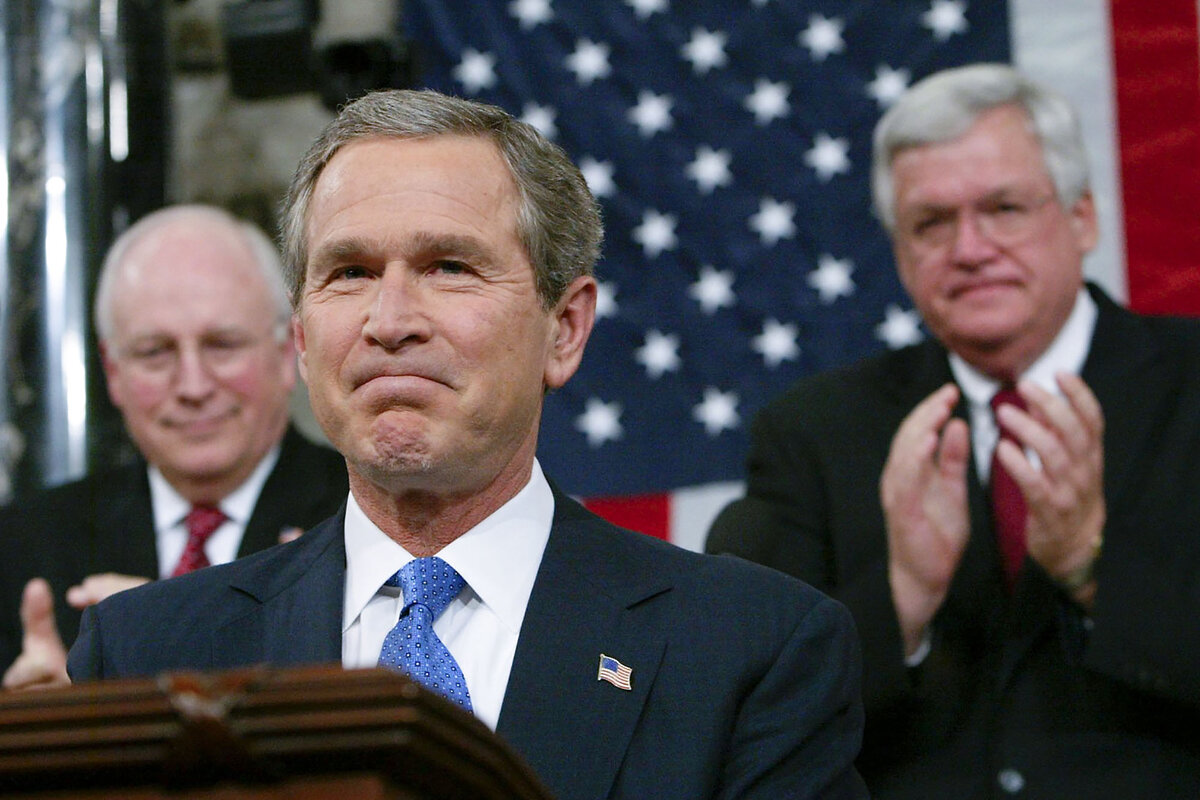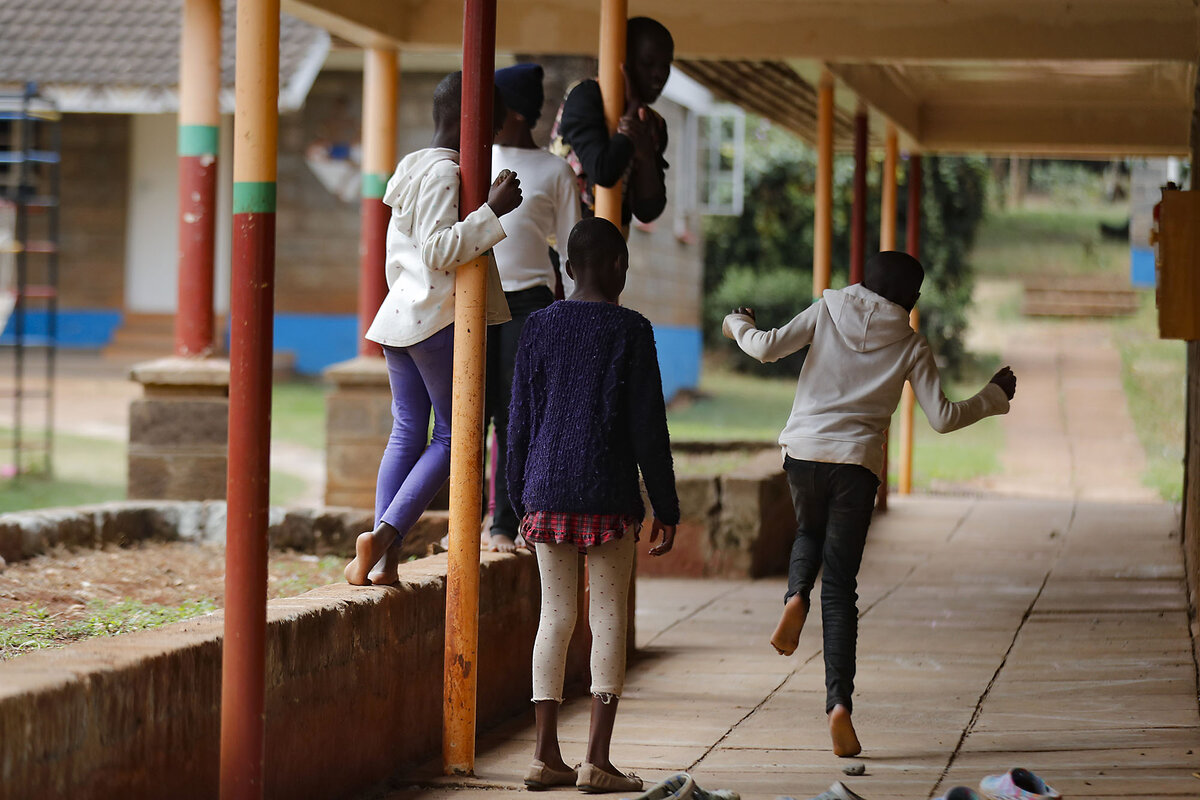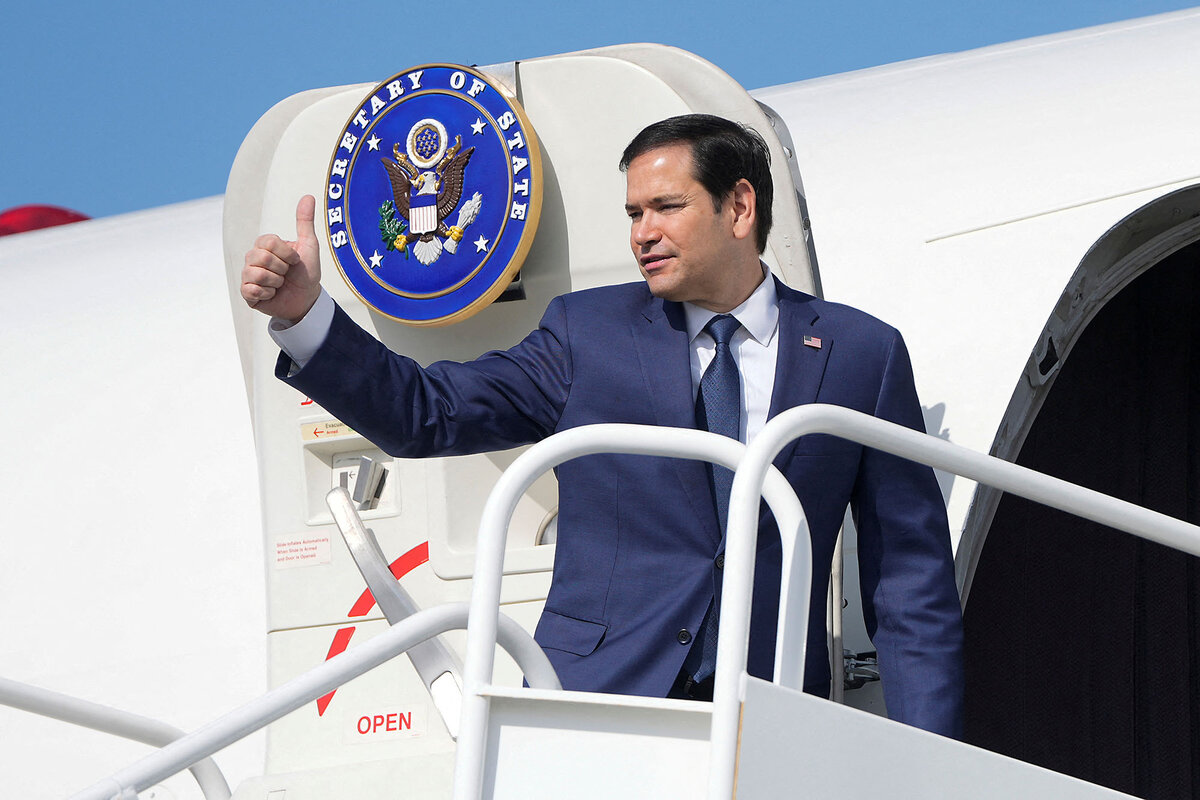USAID cuts threaten America’s most successful global health campaign
Loading...
| Johannesburg; Maputo, Mozambique; Accra, Ghana; and Maseru, Lesotho
President George W. Bush was halfway through his State of the Union address in January 2003 when he pivoted from making promises to Americans to speak about a rural doctor on the other side of the world.
The man worked in South Africa, and faced an unrivaled AIDS epidemic. But with no support, the only thing he could tell his patients to do was to "go home."
Mr. Bush told Congress solemnly that this situation should be intolerable to the United States, a place whose “calling as a blessed country” was “to make this world better.”
Why We Wrote This
The Trump administration’s sudden freeze on foreign aid and dismissal of USAID employees have left one of global health care’s great success stories – the campaign to contain AIDS – fighting to survive.
Two decades later, the program that Mr. Bush announced that night, the President’s Emergency Plan for Aids Relief, or PEPFAR, is widely regarded as one of global health care’s great success stories. According to the Joint United Nations Programme on HIV/AIDS, the program has saved 26 million lives, and today, it directly supports more than two-thirds of all people receiving HIV treatment in the world.
But now, amid efforts by the new U.S. administration to dismantle the U.S. Agency for International Development (USAID), Washington’s foreign aid arm, PEPFAR’s future hangs in the balance. Three weeks ago, all U.S.-funded HIV relief work – from treatment and clinical trials to projects fighting domestic violence and helping teenage girls stay in school – shuddered abruptly to a halt.
Though some projects were later given permission to restart, muddled communications and bureaucratic red tape mean many have not. On Thursday, a federal court ordered the Trump administration to temporarily lift the aid freeze, but it remains unclear if the decision will hold, or if and when funding might be restored.
At stake in this upheaval, public health experts say, is not just work supported directly by PEPFAR, but the entire global movement against HIV that it helped create.
“PEPFAR has changed the shape of the epidemic and transformed the way we deal with it,” says Claire Waterhouse, regional advocacy coordinator in southern Africa for Doctors Without Borders.
“It’s really been the full package,” she adds. “Now we’re faced with the brutal fact that we don’t know which parts of that package are coming back.”
Children have questions
In sub-Saharan Africa, home to 25 million of the world’s estimated 40 million people with HIV, the effects of this upheaval have been particularly profound.
When U.S. President Donald Trump temporarily blocked nearly all U.S. foreign aid in late January, every PEPFAR-funded program in the region received an order to immediately stop spending U.S. money.
In Lesotho, 1,500 doctors, nurses, and HIV counselors were instructed not to return to work. In South Africa, researchers scrambled to remove experimental vaginal rings designed to prevent HIV and pregnancy from young women enrolled in a clinical trial. In Mozambique, staff at a public hospital halted counseling and HIV tests to victims of domestic violence.
And in Accra, the capital of Ghana, the Rev. John Azumah wondered how to break the news to the children living in the home he runs there for those known as AIDS orphans. Many were HIV-positive, as is Mr. Azumah, and they received their medication through PEPFAR.
When he finally spoke to the children, they asked a lot of questions, Mr. Azumah says. “They asked me, ‘Are we going to die?’”
Since the freeze, Mr. Azumah says he has visited the U.S. Embassy a dozen times, asking to speak to someone working for USAID. Each time, he has been turned away.
Red tape
Across the continent, many individuals and organizations find themselves in a similar situation. On Jan. 28, a week after the aid freeze began, Secretary of State Marco Rubio announced that “life-saving humanitarian assistance” was exempted from the ban, later clarifying that this included some HIV “care and treatment.”
But the directive did not automatically switch those services back on. Organizations still have to apply for a waiver from USAID, a multistep process slowed down by the fact that the aid agency itself is being eviscerated.
“For many of us, we currently have one leg in, one leg out,” says one local USAID staff member in Ghana who was sent home following the aid freeze. The individual requested anonymity because they were not authorized to speak to the media.
By Feb. 9, only 5% of PEPFAR-funded organizations surveyed by one watchdog group reported that they had resumed services under the waiver. And on Feb. 11, senior USAID officials were instructed to “hold off” on approving any further waivers, according to The New York Times.
In some countries, health officials were shuffling money to maintain services while they waited, and strategizing about what to do in the longer term. “If after three months the Trump government decides to stop support totally, we must have a clear way forward,” said Selibe Mochoboroane, the health minister of Lesotho, where around 1 in 5 adults live with HIV.
Trump adviser Elon Musk has rejected concerns that the administration has put the global HIV response at risk. “We are moving fast, so we will make mistakes, but will also fix the mistakes very quickly,” he told reporters in the Oval Office on Feb. 11.
“The trust is lost”
But even if PEPFAR-funded projects restart, experts say permanent damage may already have been done. Activists and health workers have spent many years building trust in communities ravaged by HIV, fighting shame and stigma to bring the pandemic out of the shadows.
And then people “woke up one morning and there was no care,” says Carole Sekimpi, senior director for Africa for the global family-planning charity MSI. In an instant, “The trust is lost.”
Paulo Chimera, a program manager at Pfuka U Hanya, an HIV advocacy organization in Mozambique, says his organization had to cut its counseling programs, which helped those in treatment stay on track. They do not yet have a waiver to restart.
Meanwhile, much PEPFAR-funded work administered by USAID is not covered by waivers and has been frozen at least until April. This includes most projects designed to stop the spread of HIV.
For instance, over the last 10 years, PEPFAR has spent nearly $1 billion on a project called DREAMS to help teenage girls in 15 African countries stay in school.
“It’s not that they’re just saying, ‘Oh, this is a nice thing to do for teenage girls,’” says Mia Malan, editor in chief of the Bhekisisa Centre for Health Journalism in South Africa. “It’s based on evidence” from several countries that the more education a girl has, the lower her risk of HIV infection.
PEPFAR has long recognized that countries need more than tests and medicine to stop the virus’s spread, Ms. Malan says. “You need to invest in a society.”








